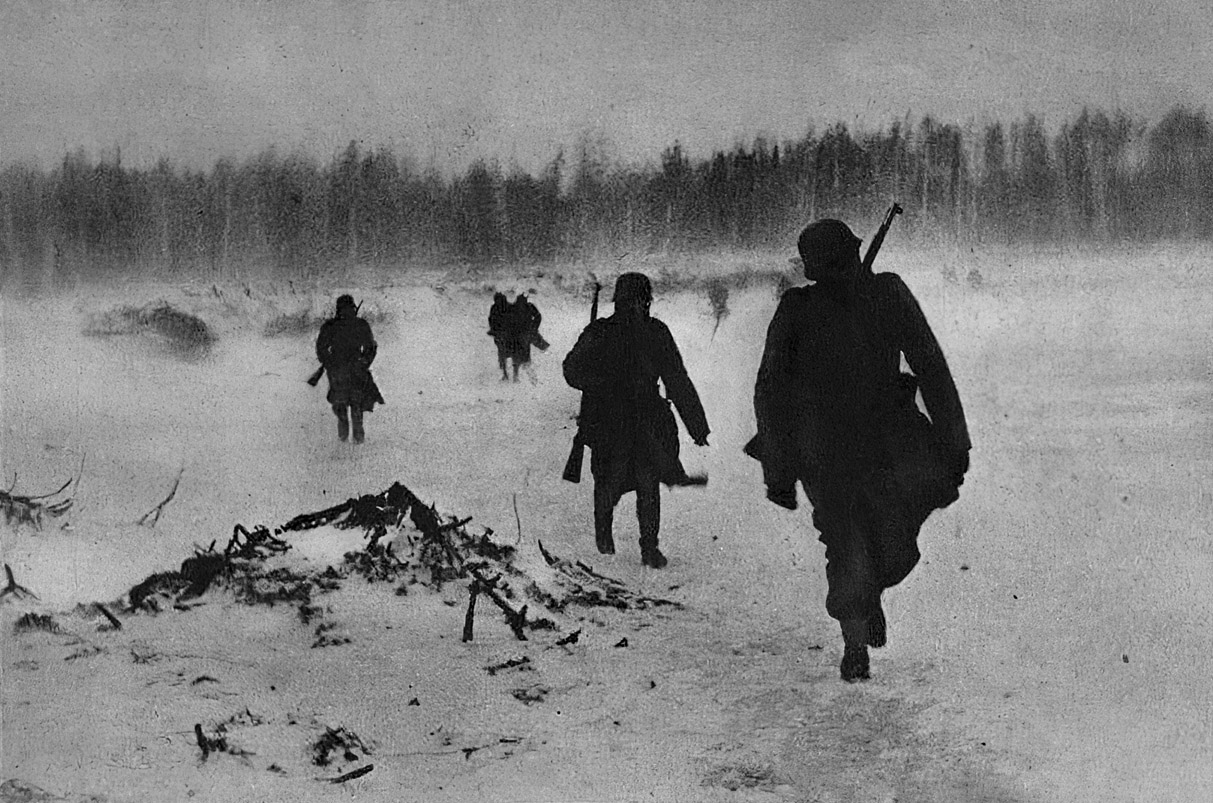
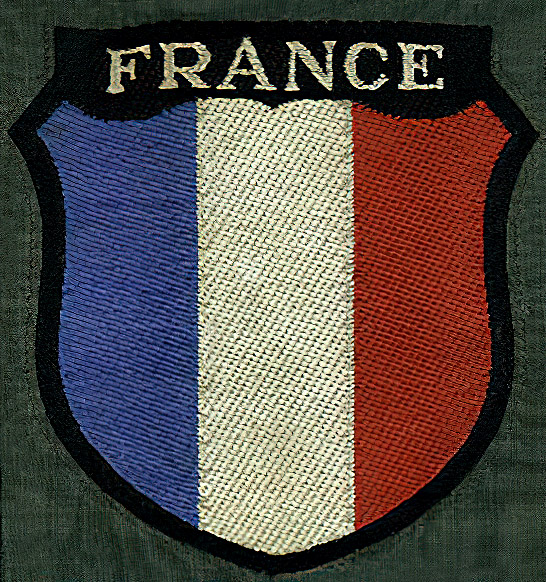
Interview with Henri Fenet, the Battalion Commander of the 33. Waffen Grenadier Division der SS Charlemagne and winner of the Knight's Cross, Paris, 1989.
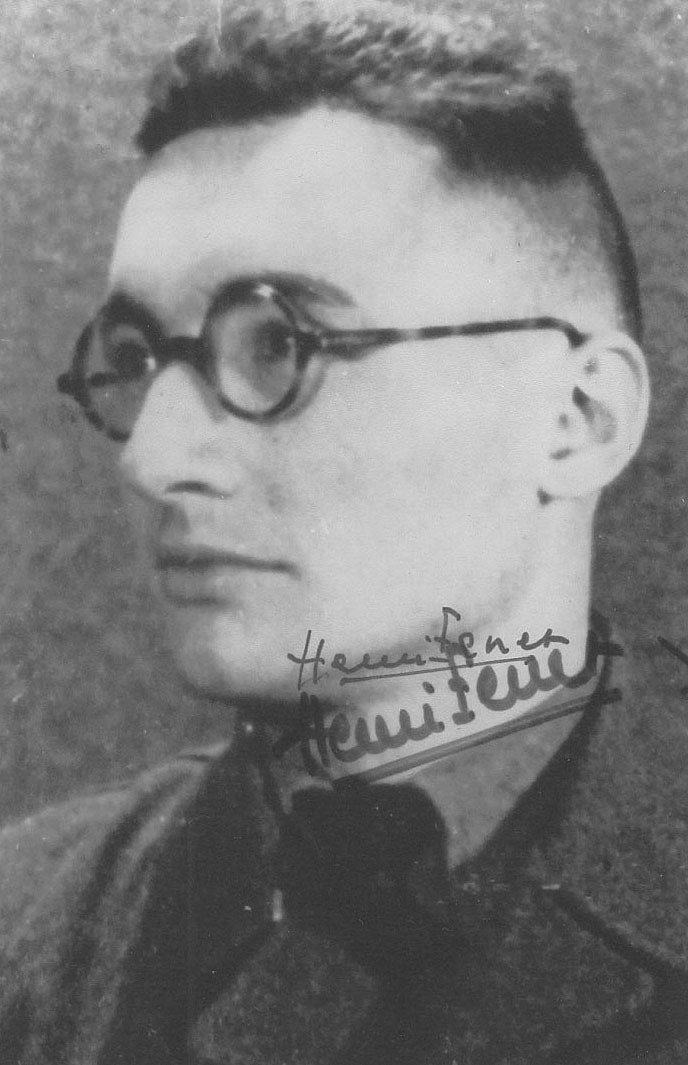



Interview with Henri Fenet, the Battalion Commander of the 33. Waffen Grenadier Division der SS Charlemagne and winner of the Knight's Cross, Paris, 1989.


Henri: Yes, my story is a complicated one. I was a Frenchman who loved my nation and people. I volunteered and served my nation in its armed forces. You could say I was a French nationalist, my culture was worth fighting, and dying, for. I also had no hatred of Germany, under Hitler, Germany was not a threat to France, and actually went out of his way to show friendship to us. It was not hard for most French to see that England was provoking a war with Germany and using France and our warmongers as pawns. Many did not want war and rejected it fervently, to the point where they were jailed or executed as traitors when it started. I was against the war with Germany, but I also was a soldier of my people and bound to my oath and duty. When the Germans launched their attack of the 10th of May, I was appalled at the bungling of the Generals. The Germans were successful with a smaller army and defeated a much larger and better-equipped French Army. Our tanks mauled the German Panzers, which were under-gunned and inferior. In the end, France fell, and I was captured and sent to a POW camp. Because de Gaulle fled with soldiers and carried on the war in exile, we could not be released.
I was well treated by the Germans, and they gave us many freedoms
in the camp. We had visitors, good food, bands, plays, and sports. By 1941,
Petain had worked to get prisoners released, and the Germans agreed to
release most. During my time in the camp, the Germans spoke of needing
volunteers that would also pay well. I admired their nation and decided I
might be interested in joining.
I was sent to the Vichy area in 1942 and hired to work in the police,
which was good work, but I missed the military life. It was in early 1943, and
by now Germany had been forced to attack the Reds, which all anti-communists knew to be a threat to Europe. I went to look into joining the
French legion that was fighting the Russians. I was welcomed in and sent for
training. Therefore, that is how I came to side with former enemies. In my
heart, I knew they were right, and working in the best interest of Europeans.
Ok, so how did you come to join the Waffen-SS? It is said they hated non-Aryans and looked down on the French.
Henri: Oh, that is false. The SS of Heinrich Himmler was pan-European,
meaning it was for all people of European blood. There are many lies told
today about the SS, and indeed all of National Socialist Germany. I felt more
welcomed by the SS than I did by the German Army. A comrade told one
example I will share with you. He was almost finished with training and was
in a small bar. He wore our nation's flag on his uniform, as we all did. An
old salty army NCO who had been drinking yelled over that it was a shame
French were in Germany and wearing the uniform, implying cowardice.
There was a Waffen-SS officer eating with his wife and overheard
this outburst. He rose up, wiped his mouth, and went over to the soldier,
saying he should feel honored that brave men were willing to fight for
Germany and National Socialism. He told him that if he ever utters
disrespectful comments about volunteers again, he would make sure he
comes to the SS to serve with the bravest men on earth. He then came over to
my comrade and bought him a drink of his choice and thanked him for his
service.
That left a deep impression, and we had been approached about the
idea of forming a French SS regiment, and to go to France to help recruit.
Every single one of us agreed and the response was very impressive, beyond
our expectations. Our morale was raised very high to see so many Frenchmen
volunteer to defend Europe. I never felt belittled or less important by anyone
in the SS; they only showed great respect and admiration.
If there had been hatred or contempt, they would not have allowed
non-Germans to attend officer schools, as I did. I was sent to Bad Tölz in
early 1944 to become an officer and was greeted by many high-level leaders.
The training was hard, but very fair, and I left feeling confident in leading
my compatriots to war.
What was your first action against the Russians?
Henri: The new 33. Waffen Grenadier Division Charlemagne, that I was now
a part of, was late in getting at the enemy; it was not until late 1944 in Poland.
We were an understrength division, with no armor, and part of the reserves.
Our division was in an area attacked by the Reds in a massive offensive. They
rolled us back and surrounded most of our companies, but these lions made
them pay a high price.
There were many combat veterans from the original LVF [Legion of French Volunteers Against Bolshevism], and these
warriors savaged the enemy in close fighting. We faced the hordes from the east with their slant eyes and stench and many fell by the bayonet. We learned
fast that they did not show any humanity to foreign volunteers, the
commissars or NKVD shot most all who fell into their hands outright.
This caused our men to fight harder, and woe to any political officers
who fell into our hands, it was an eye for an eye. The normal Russian soldier
who surrendered was treated well, and our medics took care of their wounded
as well. They seemed relieved to be out of the war, and we even used some
who were willing to help us with menial tasks.
The Reds had greatly improved their military and outnumbered the
European legions by many times. We were fighting tanks with handheld
weapons, and a few anti-tank guns. This gave us experience and confidence
that worked well for us in Berlin later on. The Germans were good to break
the entrapment for my regiment, and we were able to make it to Denmark for
rest. SS-Oberführer Puaud [Edgar Joseph Alexandre Puaud] made sure we had what we needed.
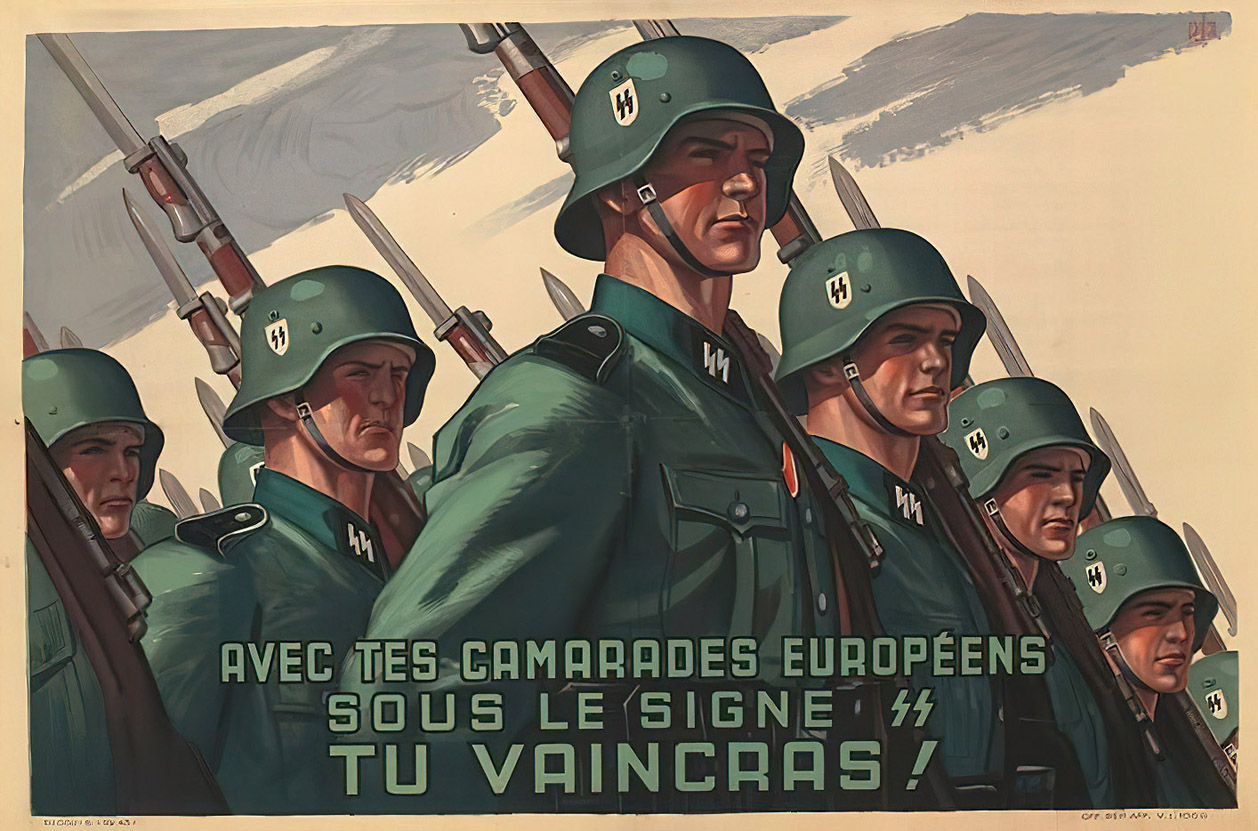
[Above: 'Avec Tes Camarades Européens
Sous le Signe SS
Tu Vaincras!
(With Your European Comrades
Under the SS Sign
You Will Win!)]
Can I ask about the claims of SS atrocities in France? It is said that SS units
killed many French and Belgian civilians for no reason other than racial
hatred.
Henri: Again, you are referring to long embellished Allied and communist
propaganda, meant to demonize National Socialism. I am French, and I can
tell you I know better than most how the French people felt towards Germany
and Hitler. While no one was happy about the war and what happened to
France, most lived their lives as normal. Not all French had to live under
occupation; many could go to Vichy [in an incredible act of decency, Germany agreed to only occupy half of France and give French authorities power over the other half until the end of the war] if they wanted to, until the threat of
invasion forced German units to move in.
The German units in France behaved very well and gained many
friends. Likewise, Frenchmen were invited to go to Germany to work,
vacation, or study. The vast majority of French accepted German occupation
and adapted a "live and let live" attitude, many befriended Germans and keep
in touch to this day. Alas, a very tiny minority resisted and fought the
Germans.
They all label themselves today as the 'French Resistance', but
make no mistake they were mostly communists or Free French agents
working for the Allies. They encouraged the civilian participation in the war,
which was illegal and against conventions. The acts they were encouraged to
do might be simply cutting a phone line, felling a tree over a road, hiding
escaped prisoners, or assassinating collaborators.
When you hear of SS crimes, these were simply reprisals against
those who willingly aided the Allies in illegal warfare. There was a case I
remember where a farm family was hiding Allied aircrews, they encouraged the man to help sabotage roads and communications during the Normandy
battle. The man was caught by an SS unit while trying to place trees across a
road. After interrogation, he took them back to his house where they found
the aircrew.
Because of the willingness to break the laws of occupation and war,
he and his wife were shot. The prisoners were turned over to the police. This was
just one of dozens of incidences regarding French civilians who were legally
executed for willingly breaking the law. Indeed, it is sad, but it is a reality in
war. The French army did the same thing. Leon Degrelle tells of executions
for petty infractions by the Belgian and French army.
I shall not speak of the terrible crimes of the Reds, and even the
western Allies that took the lives of many innocent civilians. I will not
mention the countless prisoners murdered after surrender, like my friend
Roger. Look, I would not have allied with a nation who was cruel and
criminal. Indeed, the Waffen-SS was often times forced to exact harsh
measures, but only on those who chose to act against them. Of course, today
the 'witnesses' always say nothing was provoked it was just blind hate. They
either are lying or know very little of the total story. Many hide the actions
of the condemned.
You fought in the battle for Berlin; can you tell me what that was like for
you?
Henri: Yes, we left Denmark in 1945 with orders to move to the front to
engage Red forces. While doing so, we received further orders to move to
Berlin to aid in the defence. By this time, there were millions of refugees
clogging the roads, fleeing the enemy. This made it tough to move, and we
had to stop to help the wounded at times. Our leader, [Gustav] Krukenberg, assembled
us for a fiery speech. He told us this was more than likely the end battle, and
many may not come home. He said we are SS men, pledged to the new
Europe, and owe Europe our lives if necessary.
He said anyone who has children or who did not want to go to Berlin
could now leave or go to non-combat formations, the choice was ours. So
many men decided this was too much, and they had had enough. Those of us
who wanted to keep fighting stepped forward and started singing the SS
marches in the east song. Those leaving us felt they were betraying us, but at
the same time, there were other tasks for them. They came too late to fully
understand the true meaning of our fight. With strong faith and conviction,
we marched to our destiny, loyal to the end was our watchword. We had
trucks but a blown bridge forced us to walk the rest of the way to the city.
When we arrived on the outskirts of Berlin, I was shocked and
saddened to see such a beautiful city in ruins. It looked nothing like the Berlin
I saw earlier in the war. I will say I was still impressed that even with all the
destruction, there was still order in chaos. The National Socialist system
made sure the people were well taken care of, and that work went on. The
streets were orderly, and even though the order had been given for the
civilians to leave, many ignored it to stay and fight, or protect their property
from the many foreign workers who had no food or lodging. Prisoners had
also been freed and were looting.
When we entered, I saw women being trained on weapons,
including machine guns. Young HJ [Hitler Youth] were used as well; they lived in end times
and had to be used. Although heavily bombed, the western outskirts still had
stores, or people selling out of wooden stands. We were given what little food
there was and briefed on the situation, which was bleak. The Russians now
surrounded the city.
We stumbled into a situation where a Pole killed a forester who was
trying to arrest him for looting, he killed the man and his body was brought
to his home, he had a very pretty daughter who was a party helper. Her
National Socialist spirit was unbroken and even though they were mourning
his death, welcomed my platoon into their home. She inspired us all with her
zeal for the cause, even in defeat there was strength.
We were called and ordered into action against Red tanks who had
entered the city. We had Panzerfausts, mines, and grenades, but no tanks or
anti-tank guns [such as the German 75 millimeter anti-tank gun or the Pak 43]. The Russians were foolish in that they sent tanks in alone with
no infantry. They made easy pickings; you could knock out one from a pretty
long distance with our excellent anti-tank weapons.
Two things you might find interesting is that we fought alongside
Europeans from all over: French, Ukrainians, Swedes, Danes, and many
more. This was truly a European effort to see the end of communism; we
fought because it was the right thing to do. Next, there were many civilians
still living in the city, in many areas where we were engaged; they would
often times come out of their cellars to offer food and drink.
I was truly a surreal situation for us, on one occasion they even came
out to cheer us on before moving into action. This was while the battle was
going on all around us, shells were falling, yet they still cheered. We made
the Reds pay for the atrocities they committed against the people; we knocked
out tank after tank, killed soldier after soldier. Yet they still kept coming, and
we could not overcome their numbers.
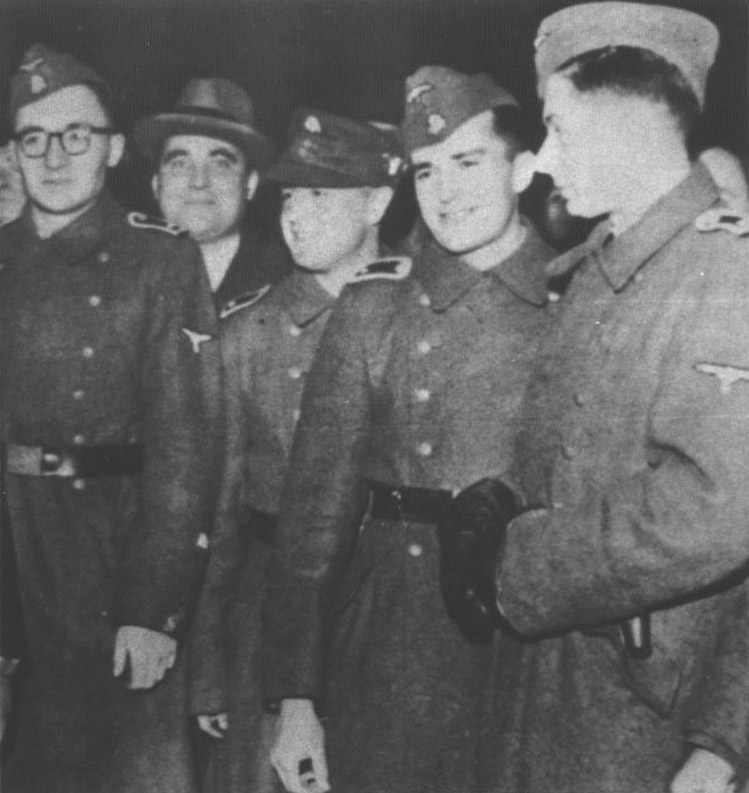
[Above: Fenet with comrades (far left)]
Henri: Yes, Wilhelm Mohnke awarded this to me on the 29th of April. It was
mostly over, and we were defending the Reich Chancellery from the Red
hordes. This award was hollow, as it was my men of the assault battalion who
earned this medal. I was only wearing it for them and those who fell for this
cause. I was part of a small group of soldiers and it was only recently that we
have been able to meet and truly speak of our deeds, but even now this is
coming under attack by our enemies, who again hold control over the media.
With respect, do you feel any sense of shame for helping the Germans,
especially serving in the SS?
Henri: No, there is no shame in me. I fought for a noble and great idea that
right now is only a small beacon of truth, but someday will shine as bright as
the sun. I fought for a better world for all to live in; there is no shame in that.
Some of my people were blinded by hate and ignorance, jailing me for my
service, threatening me with death. I fought the devil, and he was angry.
However, it is my belief that in the end there will be final victory, where we
will never have to fight this battle again. I have told you we are loyal until
the end; remember this.
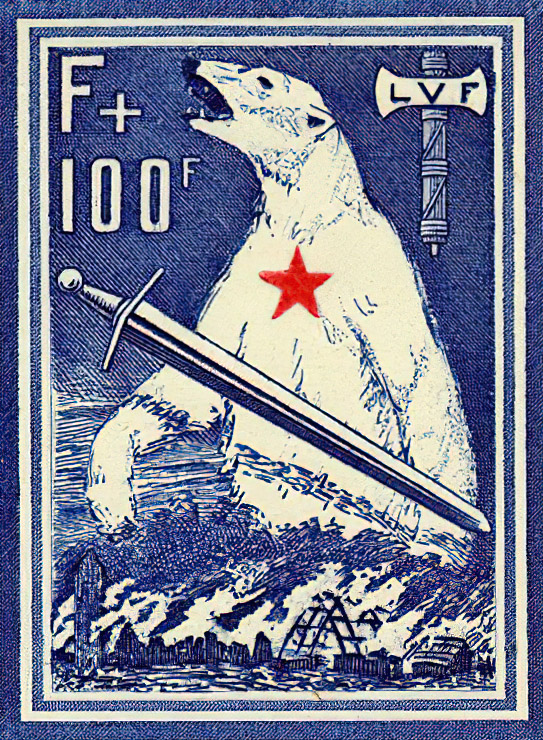
[Above: The inner art of a 1941 French souvenir sheet, with proceeds going to the Legion of French Volunteers Against Bolshevism (LVF) on the Eastern Front. It depicts a communist bear ravaging the burning countryside and a sword cleaving it.]
[Above: Valiant Frenchmen, the best their country ever produced, the very definition of heroes, march through the snow and darkness. Most of them would never return home, giving their life and blood for Europe and the world. Those that did survive the Eastern Front volunteered to help defend Berlin, being amongst the very last defenders of Adolf Hitler's bunker. They were given a choice, to go home, honorably, or fight their way through an encircled Berlin, and most likely die. Many chose death. The majority of them falling in the shadow of the burning Reichstag.]
